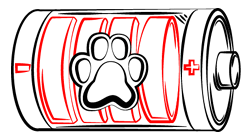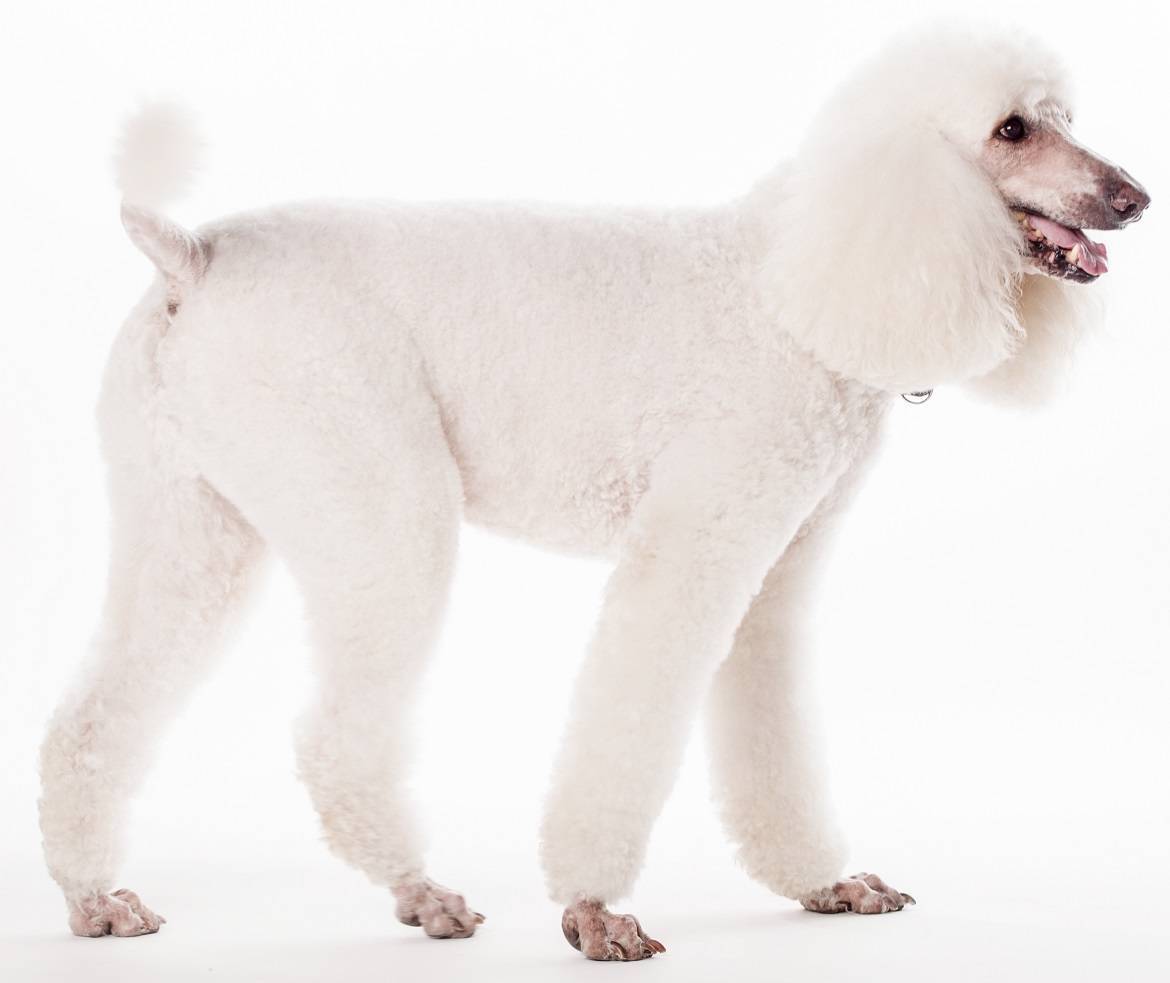
Paws ‘N’ Pups Quickview
Size
| Energy Level
| Trainability
| Paws ‘N’ Pups Rank
|
Characteristics
| Physical Characteristics: Energy Level: High The Poodle can be found in the following three size categories:
| Colors: The American Kennel Club recognizes the Poodle in many different colors, the following being most popular:
Poodles are also found in parti-color, though this is not recognized by the American Kennel Club. |
| Health & Longevity: 12-15 years Breeders screen for the following conditions:
Epilepsy exists in the breed as does Addison’s disease, Cushing’s disease and various skin issues. Legg Calve Perthese, a disease that causes degeneration of the head of the femur bone, which in turn causes pain and stiffness, is known to exist, as is gastric torsion (bloat), a life-threatening condition if immediate veterinary intervention is not sought. | |
Temperament & Train-ability
The Poodle is a very old breed, established in Germany, not France as is often thought. They were developed to retrieve downed waterfowl in marshlands. This elegant and clever breed has been used to develop many breeds, including the Irish Water Spaniel, the Curly-Coated Retriever, the Pudelpointer, and more recently, Labradoodle and Goldendoodle, not to mention many other “doodles”. Poodles embody the traits of a fine working retriever; an athletic, strong swimmer that is fond of people with a natural desire to work with people. Sometimes reserved with strangers, many Poodles are quite outgoing and social, showering everyone they meet with affection. As with other breeds developed to work with people, a Poodle is unsuited to spending long hours alone or living outside. Despite the fact that many Poodles today are companions, they retain their desire to work, and are happiest when busy; they need lots of exercise, stimulation, and companionship, without which they are likely to become neurotic, destructive and barky.
Poodles make good family dogs, being fond of children; however, a tiny toy Poodle is not recommended for young children, as accidental drops, being stepped or fallen on, etc. can result in serious injuries. A large, bouncy standard Poodle may knock toddlers down. Just as your dog will need careful socialization to learn appropriate behavior around children, your children must be taught how to properly interact with your Poodle. Children should always sit on the floor to hold a Poodle to avoid accidental drops or injury resulting from a dog jumping out of their arms. Never allow children to pull ears, poke eyes, etc. Children should be taught how to recognize when a dog needs a break and give them space.
Some Poodles can be emotionally sensitive, and will be nervous in a household with a lot of commotion or arguing. They generally get along with other animals, and are appropriate for novice dog owners who are able to see to their grooming needs. Their playfulness and joy in each day is infectious. While being quite affectionate with their family, Poodles make excellent watchdogs; they will be quick to alert you to suspicious activities. Given sufficient exercise and mental stimulation, Poodles can be apartment dogs.
Poodles possess a combination of traits that makes them easy to train; they like working with people, they are intelligent, and sensitive enough to be pleased when you are happy. This sensitivity makes them vulnerable to stress and emotional shutdown if harsh or punitive methods are used. This willing and smart breed will respond beautifully to positive reinforcement methods, giving no need to be overly harsh. A thinking dog, most Poodles will go out of their way to meet you halfway. Poodles have long experienced great success in competitions such as obedience, agility, flyball, barn hunt, nosework, and hunt tests. If competing isn’t your thing, no worries; your Poodle will be just as happy learning tricks and entertaining family and friends. The important thing is that they have opportunities to use their ample intelligence.
Grooming
Poodles have one of the most recognizable of coats. It is a double coat; a curly, wiry outer coat sits over a soft, dense undercoat. Although the undercoat is shed like any other breed, it will “stick” in the outer coat rather than falling off the dog. This is good news for fussy housekeepers and allergy sufferers, but does dispose the coat to rapid matting if not brushed. Poodles are one of the original “hypoallergenic” dogs, which is why they are the breed chosen to cross with so many other breeds in hopes of creating “new” allergy-friendly mixes. Those with allergies or sensitivities should always spend some time around the dogs they are considering, as what one person can tolerate, another might not.
The Poodle has high grooming needs; if the coat is left longer for a “poufy” look, it must be brushed and combed daily to keep mats from forming. Softer textured coats will also mat more easily. Many Poodle owners choose to keep their dogs trimmed short for more easy care; this will require grooming every 3-6 weeks, and does not eliminate the need for at-home brushing.
Ears should be kept clean and dry. Toenails should be trimmed; most Poodles will not wear down their nails, even if walked on concrete. Teeth must also be checked and cleaned regularly.
Diet
The amount of food a Poodle will require can vary depending on age, activity level, and type of food fed. Average feeding amounts will be:
- Toys – ¼ – ½ cup
- Miniatures – ¾ – 1 cup
- Standards – 1 ½ – 3 cups
Meals should be fed in two meals per day, and a high quality food is recommended. Free feeding should be avoided, as many Poodles are prone to becoming overweight, and this puts the dog at risk of many health problems. A portion of your Poodle’s daily food can be used when training to avoid overfeeding. If allergies or sensitivities occur, some experimentation may be needed to find a food your Poodle tolerates. A constant supply of fresh, clean water must always be available.
Looking for a Poodle?
 Find A Poodle Breeder |  Poodle Puppies For Sale |  Adopt A Poodle |
Cost
As is the case with many popular breeds, prices for Poodles vary widely, running from the $600-$1,000 range to $2,000 and up. Breed rescue organizations are another option, where lovely dogs needing a home can be found; adoption fees vary widely, but are generally in the $200-$500 range. Whether you acquire a dog from a breeder or rescue, do your homework to be assured that the temperaments of the dogs are tested and sound. Ongoing expenditures include the typical supplies, food, and regular vet visits.
Paws ‘N’ Pups Ranking
Paws ‘N’ Pups ranks every breed out of 4 with 1 being easiest to integrate into your life and 4 being the toughest – The lower the ranking the better.
Ranking takes into account a few basic factors such as cost, skill level needed, high vs. low maintenance, and how critical regular training is to success. The Poodle rates a 1.5, primarily due to their high grooming requirements. Besides their grooming, the Poodle is a great dog that you can integrate into your daily life because of their excellent train-ability and compatibility.
Breeds Similar To Poodle
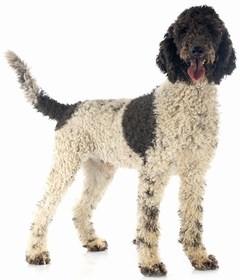 Portuguese Water Dog |  Irish Water Spaniel | 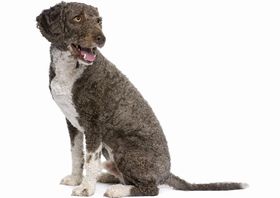 Spanish Water Dog | 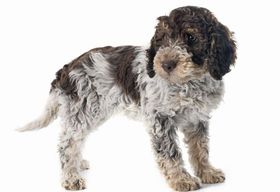 Lagotto Romagnolo |


